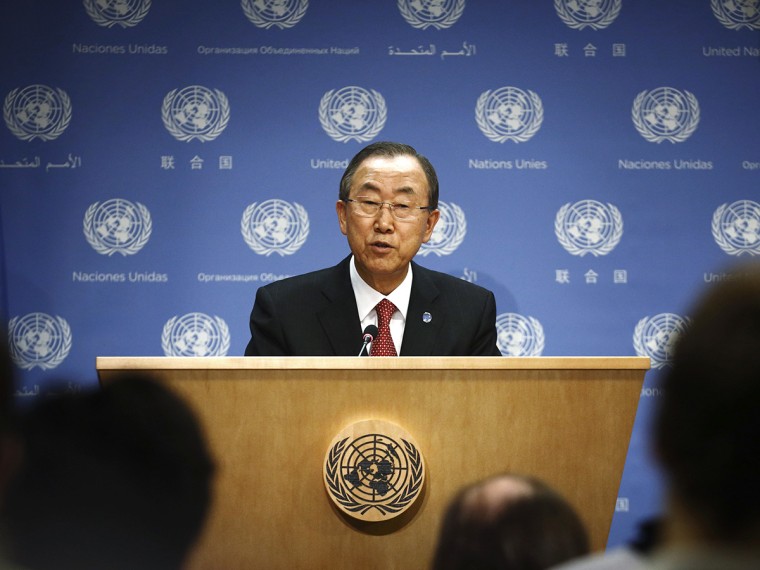United Nations Secretary General Ban Ki-Moon suggested Tuesday that any American intervention in Syria would be illegal under international law absent approval from the UN Security Council.
"The use of force is lawful only when in exercise of self-defense," Ban said during a news conference at UN headquarters in New York, "or when the Security Council approves such action."
The world is awaiting the results of a UN investigation into the chemical weapons attack that the US government says killed nearly 1500 people and was perpetrated by Syrian dictator Bashar al-Assad against rebel forces on the outskirts of Damascus. Although President Barack Obama has said he believes he has the authority under U.S. law to attack Assad in order to deter future use of chemical weapons, he has opted to seek congressional approval first. Ban's remarks, however, suggest that the UN secretary-general would view any American use of force against Assad without the approval of the UN Security Council as illegal under international law.
"I'm confident in the case our government has made without waiting for U.N. inspectors," Obama said Saturday. "I'm comfortable going forward without the approval of a United Nations Security Council that, so far, has been completely paralyzed and unwilling to hold Assad accountable." Representatives of Russia, a key Syrian ally that sits on the UN security council, have said that they find the evidence that the Assad regime is responsible for the attack "unconvincing" and it is expected that Russia would block any attempt to get UN approval for military intervention in Syria.
While Ban said that "we must put an end to the atrocities the Syrian people continue to suffer," he also urged the international community to "consider the impact of any punitive measure on efforts to prevent further bloodshed and facilitate a political resolution to the conflict."
A conclusion to the UN investigation of the attack is not imminent—Ban said that UN investigators would have to return to Syria at least once more, and the soil and bio-medical samples gathered on their previous trip would not arrive for analysis until Wednesday. French and German intelligence have concluded that the U.S. is correct in believing that the chemical weapons attack was perpetrated by the Assad regime, though Germany continues to oppose military intervention absent approval from the Security Council.
There is overwhelming agreement that a chemical weapons attack occurred, but the Assad regime has sought to place blame on the Syrian rebels. "Chemical weapons and agents were used by the armed groups who are supported by the United States, by Turkey, by Saudi Arabia among others," Syrian Deputy Foreign Minister Faisal Mekdad told the BBC on Monday.
The conclusions of the UN investigation seem unlikely to sway the dynamic on the Security Council, because the investigators' mandate is only to determine whether or not a chemical weapons attack occurred, not who is responsible. Asked by a reporter whether the UN investigation's mandate was limited by the UN or by the Syrian government, Ban said that the UN had decided on its own to restrict the investigation to whether or not an attack occurred, and not determine who carried it out.
1
